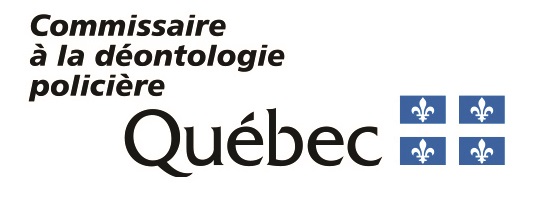File a complaint
Investigation
Investigation
Decision to Investigate
An investigation is an exceptional measure. The decision to hold an investigation falls within the jurisdiction of the Commissioner:
- when he considers that a complaint is of public interest;
- when the Minister de la Sécurité publique so requests;
- in the event of a failure of conciliation, if the Commissioner so decides.
A complaint is in the public interest when, for example, it involves:
- death or serious injury to a person;
- a situation where public confidence may be seriously compromised;
- a criminal offense or a repeat offense.
Investigative Powers of the Commissaire à la déontologie policière
Everyone must cooperate with our investigation, except, under the law, the police officer, the wildlife protection officer, the special constable, the highway controller or the UPAC or BEI investigator who is the subject of the complaint. However, this person has the opportunity to tell the investigator their version of what happened and to answer their questions if they wish.
Our investigator will also have access to all police operational documents related to the complaint (e.g., occurrence reports, recordings of 911 calls, administrative forms, video recording of a detention, etc.).
Conduct of the Investigation
During the course of the investigation, the investigator or the investigator makes sure to collect the documentary evidence relevant to their investigation from the witnesses, the police services and any other relevant source.
The investigator will contact all witnesses or stakeholders deemed relevant, including the complainant and the subject of the complaint.
When these people meet the investigator, they have the right to bring a person of their choice. However, this person should not be involved in the event that is the subject of the complaint, since they could also be interviewed. The accompanying person cannot intervene in any way whatsoever during the interview.
A report is written when the investigation is completed. The complainant and the subject of the complaint will receive a letter notifying them of the end of the investigation.
The investigator must submit their investigation report to the Commissioner within six months. There may be an exception to this, for example, if it is necessary to await the result of a legal proceeding, a criminal investigation or an independent investigation before being able to complete the police ethics investigation. This period may be extended by the Commissioner due to exceptional circumstances.
Ending an Ongoing Investigation
The Commissioner may put an end to an investigation in progress if he considers that it becomes useless to pursue it. The reasons justifying the decision to end an investigation are generally the complainant's lack of cooperation, their withdrawal or the absence of ethical breaches revealed by the checks carried out during the investigation.
The complainant will receive a written and reasoned decision summarizing the investigation and informing him of their right to have this decision reviewed by the Commissioner. The complainant then has 15 days to submit their request for review to the Commissioner, citing new facts or elements.
Decision After the Investigation
At the end of an investigation, the Commissioner may decide:
- to cite the police officer to appear before the Comité de déontologie policière if he is of the opinion that the evidence warrants such action;
- to dismiss the complaint and close the file.
In addition, he may send the investigation file to the Directeur des poursuites criminelles et pénales.
The Commissioner may dismiss the complaint if he considers that there is insufficient evidence to cite the persons targeted by the complaint to appear before the Comité de déontologie policière.
The complainant will receive a written and reasoned decision summarizing the investigation report and informing them of their right to have this decision reviewed by the Comité de déontologie policière. The complainant then has 30 days to submit their request for review to the Comité. If the Comité overturns the Commissioner's decision, it may order the Commissaire à la déontologie policière to continue their investigation, to hold a new one or to cite the police officer or peace officer concerned to appear before the Comité.
<< 2. Conciliation Communication With the Parties Involved >>
File a complaint
Need help?
If you want more information or if you need help drafting your complaint, you can contact us.
deontologie-policiere.quebec@msp.gouv.qc.ca
